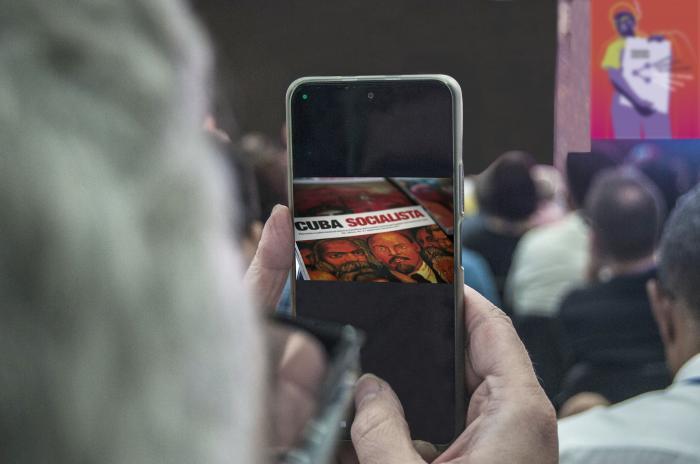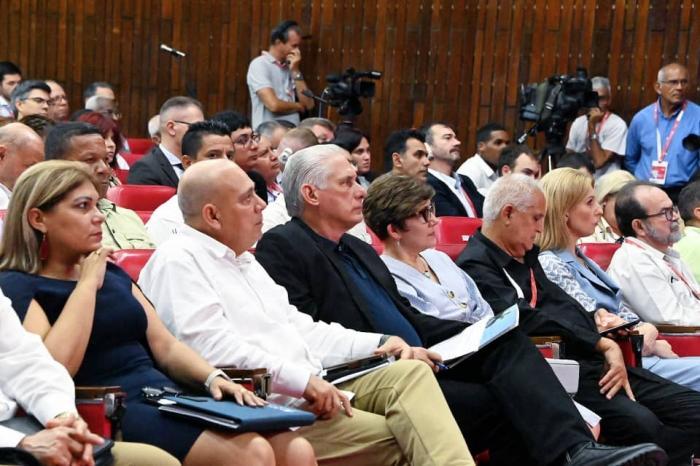
In this world, no people can save themselves alone, and threats to any of our peoples are threats to us, to other peoples," said Miguel Díaz-Canel Bermúdez, First Secretary of the Party's Central Committee and President of the Republic, at the end of the first day of the Third International Meeting of Theoretical Publications of Left-wing Parties and Movements.
Díaz-Canel called on the world's left-wing forces to find answers to "how we mobilize consciousness, how we not only inform, but how we have a strategic political communication that is sensitive, that has a connection with the people, that builds consensus, that sows consciousness and that mobilizes us from our daily lives."
This, he said, is how ideological sovereignty is achieved; how we can offer a counterpoint to colonization. And in this, "international solidarity is very important, how we integrate, how we articulate ourselves, because sovereignty in a world like this is not only territorial, it is also symbolic, cultural, spiritual. And we must all defend ourselves and we must all unite in the struggle against global capitalism."
His reflections were in response to the keynote lecture Information and Media Manipulation: The Left Facing the Challenges of Quantum Artificial Superintelligence, given by French-Spanish professor and journalist Ignacio Ramonet.
The professor analyzed the risks and threats posed by the new scientific and technical revolution, quantum technology, as well as the opportunities it offers to progressive forces at a historic moment in which we are experiencing "an intimidating international geopolitical moment."
What is happening, he said, is a major technological breakthrough that is even undoing the current model of communication.
Today, the French-Spanish writer summarized, we are living in a time of great change, and we, the forces of the left, must be ready to face it, to fight for our freedom.
AI, THE PROS AND CONS
Professor Ignacio Ramonet's master class was an overview and warning about the rapid transformations brought about by artificial intelligence and the risks that lie ahead with the progressive application of the concepts of quantum physics, quantum computing, and quantum artificial superintelligence.
Artificial intelligence, he added, is raising all kinds of problems, from the labor market, including the marginalization of the middle classes in capitalism, to a high risk of misinformation and manipulation.

AI, he said, will bring about a radical change in our ways of life, thinking, and acting, and the forces of the global left must work to address the threats, but also the virtues, of these technologies.
In this regard, he said, an example we should follow is that of Commander-in-Chief Fidel Castro Ruz, who from very early on in the Revolution worked to develop computing and its assimilation by the Cuban people, from the construction of computers in the 1970s to the creation of the Youth Computer Clubs and the inauguration of the University of Computer Science.
A DEEPLY REVOLUTIONARY SPACE
Ignacio Ramonet's keynote speech has stirred our thoughts, feelings, commitments, responsibilities, and visions with which we on the left must address the enormous challenges and risks we face in today's world.
This was pointed out by Díaz-Canel to the participants, to whom he confirmed that Cuba and the Communist Party of Cuba will continue to hold these exchanges every year.
I believe," he said, "that in these exchanges, we can maintain a holistic debate from the left on all the issues we face today, because this is not only an academic space, but also a political and ethical one, and above all, a deeply revolutionary space committed to socialist construction and the will to change the world we live in.
The forces of the left, Díaz-Canel continued, need above all a systematic debate today, and we also have to design that, in order to move from reflection to actions that bring us closer together, so that we can also come up with solutions in projects, in programs, in defense of the issues we discuss.
"Today, publishing from the perspective of leftist ideas and socialism, in this world of uncertainty (...) is an act of resistance. And if we take it to the vision we have in Cuba of resistance during so many years of genocidal blockade, now intensified, I would add that it is an act of creative resistance, because the issue is not to resist, the issue is how, by resisting, we evolve, how, by resisting, we rise above all that structure of colonization, of hegemony that they want to impose on us."
Díaz-Canel emphasized that this event is part of the activities for the Centennial of Commander-in-Chief Fidel Castro Ruz, because, he explained, we also have to bring Fidel into this time, we have to find answers to the problems of this time in that legacy of creative, Martí-inspired, Marxist, Leninist, revolutionary thinking of Fidel.
Fidel was the one who called on us to believe that a better world was possible, who taught us that ideas are not kept to oneself, but multiplied. This meeting is a trench of ideas in which we are all fighting, he said.
The Cuban president praised the participation of left-wing parties and movements that carry out their work in capitalist societies, as well as those in countries that are building socialism.
He explained that "the issue is not to go against technology, it is not to go against the development of science or innovation."
"The vision we have to offer from the left, in light of these technologies, is how we can use them in an emancipatory way."
LEADING FIGURES IN THE BATTLE FOR TRUTH
The President reiterated the importance, given the challenges facing the world today, of holding these meetings on a regular basis. Their importance, he said, lies in the fact that these publications are among the leading figures in the battle for truth in the face of misinformation and media manipulation.
That is why, he said, "as left-wing publications, we have a real historical responsibility in this battle for truth. And we have to educate our citizens in media literacy with critical thinking, enabling them to dismantle this manipulation and recognize the revolutionary word as a tool of liberation."
"Today, to think is to fight, to publish is to resist, and to communicate is to liberate, and we must all be committed to this battle," emphasized the Head of State, calling for continued defense and communication of the truth about Palestine, Venezuela, and Cuba, victims of an atrocious
imperial campaign.
FOR AN INTERNATIONAL NETWORK OF LEFT-WING PUBLICATIONS
After asking participants to finalize everything discussed in terms of a coherent and systematic political communication strategy, he invited them to "create an international network of critical and sovereign publications, recognizing the urgency of coordinating efforts in the face of imperialism's ideological offensive.
He suggested that this be a project with the aim of consolidating an international network of theoretical publications committed to social transformation, ideological sovereignty, and the unity of the peoples of the South.
"Let it be," he said, "a voice, a network that articulates all print and digital media and the entire system of leftist theoretical publications that promotes the exchange of knowledge and strengthens the production of emancipatory thought, from an anti-imperialist, socialist perspective that is also appropriate to the different regions of the world.
"Let it allow," he added, "the linking and articulation of leftist theoretical media in Latin America, Africa, Asia, and Europe. Let it promote thematic co-publications on strategic issues, political communication, cultural sovereignty, popular feminism, critical ecology, class struggle, among others. Let us create a collaborative multilingual digital platform with free access to theoretical content, research, and training materials.
"It should promote," he added, "editorial meetings, seminars, and training workshops for young communicators and thinkers. It should establish mechanisms for editorial cooperation, translation, and dissemination among allied media and coordinate joint political communication strategies in the face of imperialist media offensives against any of our countries.
"Let it not be," summarized the Cuban president, "just an editorial project, but a political tool, a commitment to ideological unity, to the visibility of our struggles, to the training of new generations of revolutionary communicators. And to that I invite all of you."















